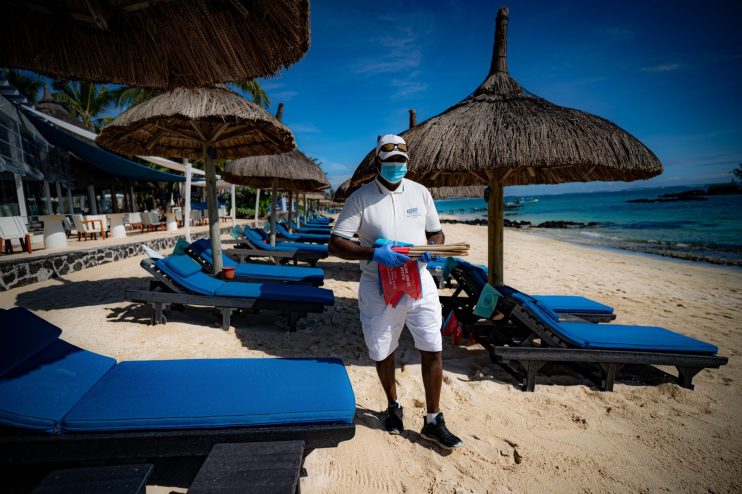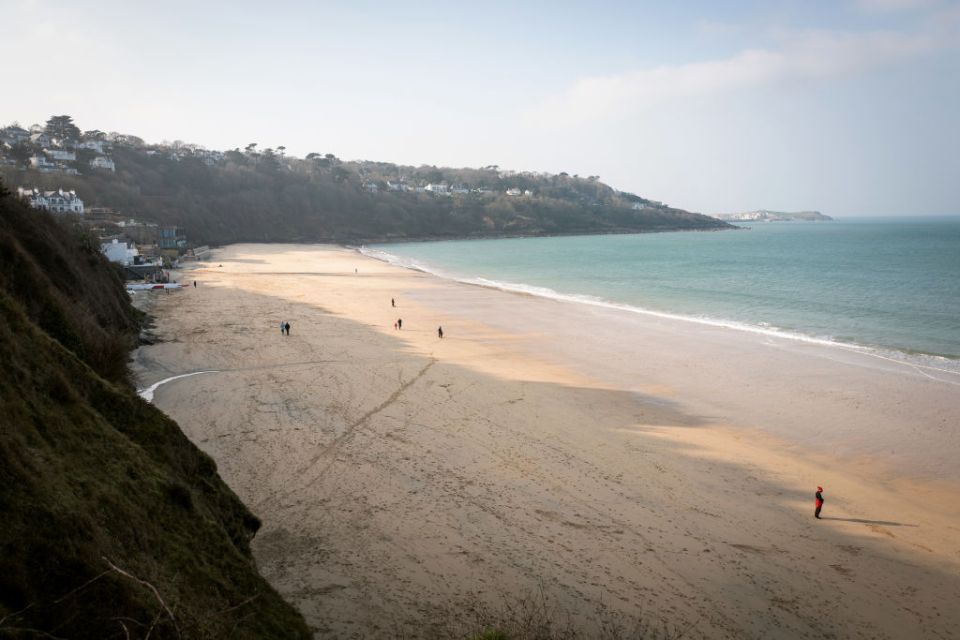Future of travel special: Pent-up wanderlust, streaming and, of course, a lot of tech

After three strict lockdowns, the old adage ‘trip of a lifetime’ has never been more appropriate.
Nearly two years into the pandemic, constant reminders of how precious life is have inevitably left their mark, bringing an increased awareness of what really matters, which is quite a motivation for many people to stop putting off that once in a lifetime trip.
So, after dreaming of freedom for the past two years, people are finally beginning to release their pent-up passion for travel, with substantial increases in searches for trips to once-in-a-lifetime destinations.
Good examples are the home of the Incas, Machu Picchu, with flights to the Peruvian cities of Lima and Cusco up by nearly 50 per cent, according to various booking sites.
Whether the dream is to finally sail around the world or take that long haul trip to visit relatives on another continent, in 2022 many people will finally book those meaningful, extreme or never would have imagined trips.
Research by Unforgettable Travel, undertaken during the height of the pandemic and shared with City A.M. today, showed that the most popular destinations are not what you might have expected previously.
Top results were once in a lifetime experiences, such as hiking to Mount Everest base camp in Nepal and Tanzania is an outlier in terms of demand for travel, with searches up by 36 per cent for the country famous for safaris to see the Big Five in the wild.
Visits to the Egyptian Pyramids are also high on the wish-list, while flights to Petra in Jordan showing a 22 per cent rise.
All the signs suggest this trend will continue to grow, with the Indian Ocean islands and even Antarctica showing increased demand for travel.
So what does the future of travel hold, and how will post-pandemic business trips be framed?
Friendcation
When Instagram hashtags like this are trending, you know that one of two things is happening. Either Rachel, Monica, Phoebe, Chandler, Joey, and Ross have reunited for a TV special, or the world of travel is witnessing a new phenomenon.
Spoiler alert: it’s the latter. After a long period of lockdowns and restrictions, enjoying time with friends has never been higher on the agenda. If 2020 was the year of Zoom quizzes, 2022 will be (fingers crossed) the year of the grand, in person, reunion.
The #Friendcation trend stands to reason. With family the priority, you may have only recently seen friends, briefly, for the first time in a very long time – and if the distance between you is a flight, you may still be waiting for that to happen.
In the UK, the relaxation of restrictions has seen an explosion in the number of large group holidays being booked. One firm, Big Cottages, reported a 600 per cent rise in bookings for groups of over 20 people.
All of which goes to show that while the past couple of years would have been infinitely harder without Zoom, Microsoft Teams and WhatsApp, they are no substitutes for being able to see friends in real life.
According to data from travel tech firm Amadeus, this trend is already well established. Searches for travel to Cancun, a popular destination for groups of friends, have more than doubled year-on-year, while Hawaii has also seen a similar spike in interest.
Searches for Las Vegas trips are up 61 per cent, Colombia’s friends’ hot spot of Cartagena is up over 200 per cent and in Europe Barcelona and Ibiza have seen healthy double-digit increases.
Active ecotourism
The time for all talk and no action about the environment is long gone. Today’s focus is on action, and that applies to the travel sector as much as any other part of our modern lives.
That’s why we expect ecotourism to shift from talking point to bona-fide trend in 2022.
At the heart of this trend, however, lies a dilemma. The pent-up demand for travel is abundantly clear, but how can this be squared with environmental concerns? A bigger carbon footprint is hard to justify.
The answer appears to lie in ensuring that travel is sustainable, considering not only environmental impact but also the social impact on the communities we visit.
Travellers want to add purposeful elements to their holidays, such as including work to help rebuild communities as part of their trip. They are also keen to see their spend directly benefiting the people and places they visit.
In a recent Amadeus-commissioned survey, 37 per cent of respondents think opportunities for travelers to be involved in the preservation of tourist destinations will help the industry to become more sustainable in the long term.

Meanwhile, a growing number of operators are promising to go beyond carbon offsetting and offer a measurable and positive impact on the environment.
For example, the firm B. Journeys was specifically set up to help travel businesses measure their environmental and social impact, and support them in gaining BCorp certification.
In South Africa, Mantis Group offers ecotourism impact programs including the opportunity to support rhino conservation efforts in Tanzania, while Habitat for Humanity has developed travel & build and global village programs, and Global Citizens Network has entered a collaboration with the White Earth Indian Reservation in Minnesota, to name a few examples.
This trend is already having an impact. Searches for travel from the UK to the eco-paradise of Costa Rica are up by 234 per cent year-on-year and in Europe visitors to carbon-neutral Iceland are up by a healthy 11 per cent.
Business travel
The way we worked has changed, and so will business travel. Few would deny that Covid-19 has transformed the way conduct business, in many cases permanently.
Many in the UK’s workforce now have the potential to work from anywhere, and in some other countries that percentage is even higher, while many companies, for example, Spotify, have even announced that its staff will permanently work from home.
Some companies are taking even more creative approaches, like Bloomberg, which has revisited what constitutes business travel and traveling into the office, offering its 20,000 global employees a daily commuting allowance.
While most companies know by now that videoconferencing works well, nothing replaces a face-to-face meeting. Amadeus travel data shows a return of business travel, with half of all travellers saying they will be traveling for business to a destination requiring a flight later this year.
In fact, four in five business travellers are prepared to board an airplane for work right now, provided safety measures are in place.
Therefore, many employers are also taking a fresh look at the way their people travel.
Many staff have become used to the time and money they save on their daily commute. Companies are looking at bringing departments together in central locations, with days working in the office placing a greater emphasis on social elements and team bonding. Some businesses will even begin booking weekends or days in hotels as a way to reunite employees.
Wanderlust streaming
In many ways choosing a holiday has never been more complicated. Balancing environmental impact, health concerns, travel restrictions, and the cost associated with potential cancellations can confuse even the most seasoned of travellers.
Yet for many the process of researching holidays has become a passion. This is hardly surprising when for so many months the most we could do was surf the web and dream of getting away somewhere.

One unexpected outcome of the pandemic, however, is that people get travel inspiration from a wider variety of sources.
Take the exponential growth of streaming services such as Netflix: according to official statistics, Britons spent a third of their waking hours watching TV or online videos in 2020.
This marked increase in viewing time means consumers have seen – and been inspired by – a world of exotic backdrops. This relationship is so important that UNWTO and Netflix have recently partnered to publish a report that analyses the role of movies and series as drivers of tourism.
For example, following 2020’s hit show Normal People, tourism bosses in Ireland planned to cash in on the success of the hit show by promoting Ireland as a tourist destination to fans. Tourism in Porthgwarra, Cornwall, increased by as much as 50 per cent, according to Visit Cornwall as a result of the TV show Poldark.
Artificial intelligence
This trend is here to stay, and will only grow, reinforced by the artificial intellience driving our smart speakers including Amazon’s Alexa.
Alexa will begin to understand where a consumer might want to visit, and provide suggestions, with the consumer not having to even think about it. Travel firm Quo Vadis Travel used Amazon Alexa to develop voice-activated technology for customers to search and book travel with just a few commands, making planning travel that much easier.
Ebookers also found unique ways to use sensory perception and biometric technology to help travellers plan their ideal holidays.
The online tool SenseSational uses facial recognition to gauge users reaction to a stimuli, and ultimately provide holiday recommendations through a fun experience, taking the work out of planning holidays for consumers.
Futuristic and fast
Technological progress inevitably reaches more people, and the impact of scientific developments ends up impacting many around the world. Eighteen years after Concorde was grounded for good, advanced plans are afoot for a new generation of passenger super jets.
Across the pond, United Airlines recently announced plans to buy 15 new supersonic airliners and “return supersonic speeds to aviation” before the decade is out.

For those who prefer to stay closer to the ground, hyperloop technology promises to transport passengers in a vacuum-encased pod at speeds of up to 600 miles per hour.
The concept recently came closer to becoming a reality when Virgin Atlantic carried out a test run of a hyperloop train in the Nevada desert. A hyperloop link between Gatwick and Heathrow airports – 45 miles apart on opposite ends of London – could transfer passengers in four minutes.
There are also plans afoot to build a 12-minute, 80 mile hyperloop link between Dubai and Abu Dhabi in the United Arab Emirates.
If speed isn’t your thing, Florida-based Space Perspective has just announced the launch of a space balloon, Neptune One, which will start flying passengers into the heavens in 2024 at a leisurely pace of 12 miles per hour.
So, the traveller takeaway may be, get ready; it’s coming fast and not too far in the future. More and more people will be spending more time exploring the world and the universe.